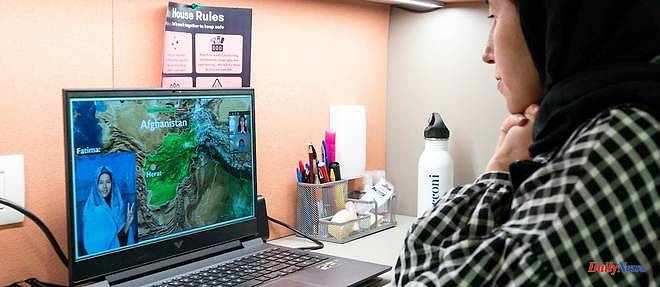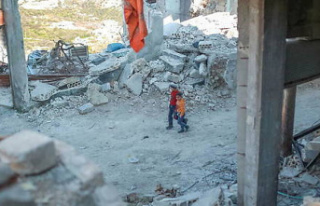A potential target of the Taliban, the young feminist Fatima Haidari had to flee Afghanistan to find refuge in Italy. Now, she organizes virtual tourist visits of her country, in order to finance clandestine courses for Afghan women deprived of education.
The great blue mosque with its enamelled earthenware, the citadel which offers panoramic views, the antiques bazaar... Fatima plunges cyber-tourists into the world of Herat, a city in western Afghanistan that she left when the Taliban returned in August 2021.
Black scarf tied around her head, leather vest, she captures her audience, through Zoom, with a passionate story about the wonders of Herat, from her student hostel in Milan where she is taking courses in international politics at the Bocconi University.
At the end of the round, the questions fuse. The dozen intrepid registered for the occasion on the site of the British tour operator Untamed Borders (Untamed Borders) are seeking to learn more about a possible trip which promises to be perilous to say the least.
"When you hear about Afghanistan, you think of war, terror, bombs. I want to show the world the beauty of the country, its culture, its history," says Fatima, 24, in a fluent English.
Among the virtual tourists are British, Germans, Italians and Indians. A third of the income generated by these towers finances English lessons given in secret to young Afghan women.
The Taliban have drastically restricted women's freedom, forcing them to wear burkas or black chadors in public and banning them from secondary schools and universities as well as many public jobs.
Afghanistan's first female tour guide, Fatima, with a sweet, beaming face, was being insulted in the streets of Herat, boys were throwing stones at her and clerics accused her of "doing the work of the devil", especially when she accompanied men.
"The Taliban are afraid of women and their strength. We fight them with the power of our pens, instead of weapons," says Fatima, seated in the small kitchen she shares with four other students.
Access to education will have been an obstacle course. At the age of seven, her parents sent her to herd sheep in the rocky mountains of her native region, Lal Sar Jangal, in the province of Ghor (center).
“I would arrange to take the sheep to graze near the river where the boys had school and secretly listen to their lessons,” she recalls. For lack of a pen, "I wrote in the sand or in the clay."
When she was ten, her penniless family moved to Herat. Thanks to the sale of traditional clothes that she embroidered until late at night for three years, she was able to buy notebooks and finance a school.
The youngest of seven children, Fatima managed to convince her parents to let her go to the University of Herat, where she began studying journalism in 2019.
"They wanted me to become a perfect housewife. But I didn't want to follow the same path as my two sisters and end up facing an arranged marriage," she says.
Since September 2022, Fatima has been one of the twenty refugee students hosted by Bocconi University. Jeans tucked into boots, backpack containing her laptop... Fatima blends in with the crowd, sitting in the sun on the campus stairs where she chats with her classmates.
A life far removed from that lived by millions of women in Afghanistan since the takeover of power by the Taliban. "They are confined to the house, it is as if they are locked up in a prison or in a tomb where they are buried alive".
Fatima Haidari is part of the Shiite Hazara minority, victim according to her of a "genocide" in Afghanistan. Frequent attacks on Hazaras have been claimed by ISIS, the regional branch of the jihadist group Islamic State, which opposes girls' education.
When the Taliban arrived, Fatima had to flee, warned by the local tour operator who employed her that she was one of their possible targets.
She found herself amid chaos at Kabul airport, where thousands of Afghans were desperately trying to board a plane to flee the country.
"The Taliban were hitting the crowd with their Kalashnikovs, bullets were whizzing past my ears and a young girl collapsed dead, very close to me. I thought I was in a horror movie, but it was the reality", recounts she, still in shock.
Thanks to the help of a European soldier, she was able to cross the barriers and board a plane for Rome, after missing flights to the United States and Poland.
His dream ? "Return to Afghanistan to found my own travel agency and hire women as guides". But, she laments, "as long as the Taliban are in Afghanistan, it is no longer my homeland".
02/15/2023 09:45:25 - Milan (AFP) - © 2023 AFP












